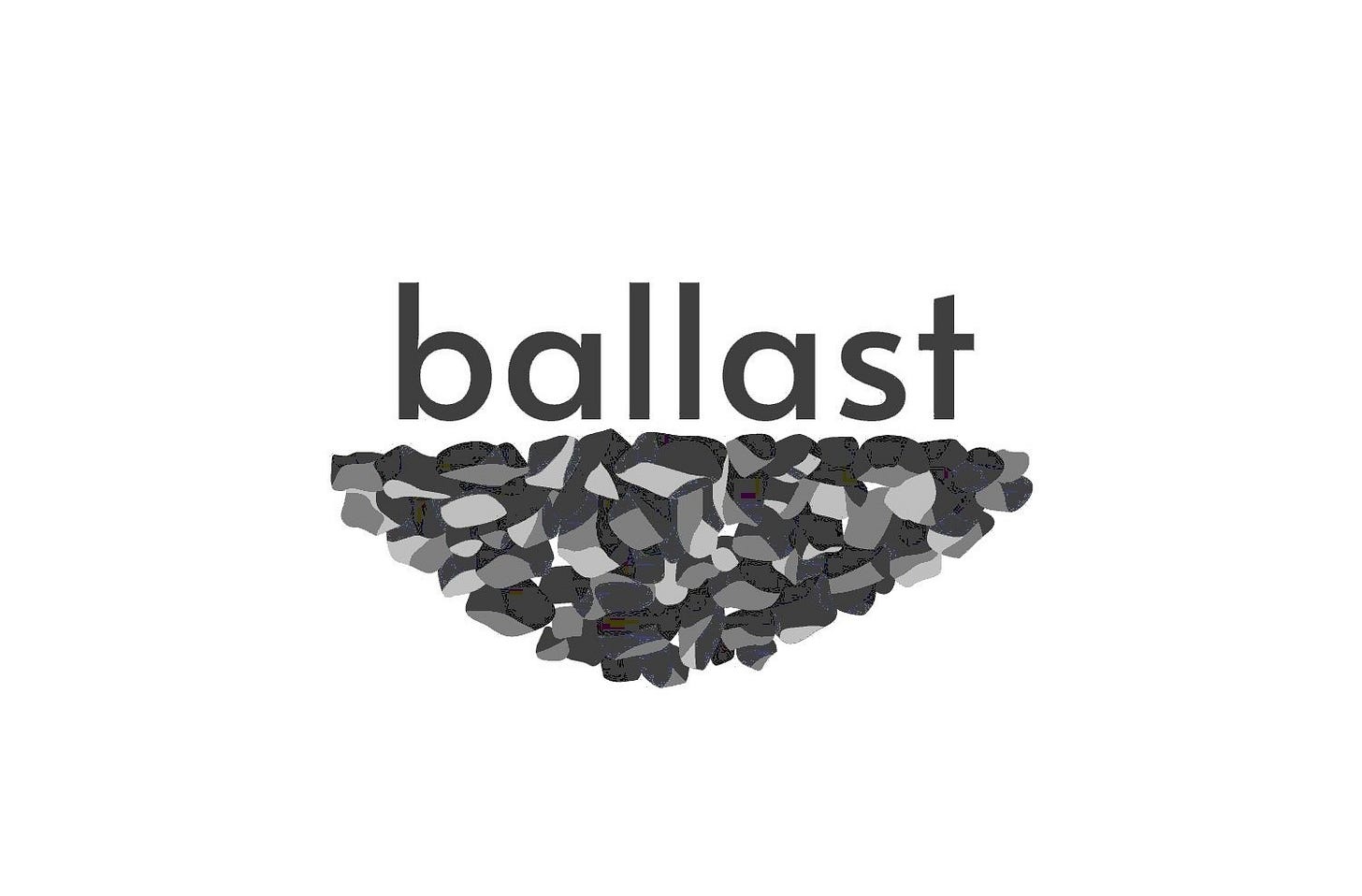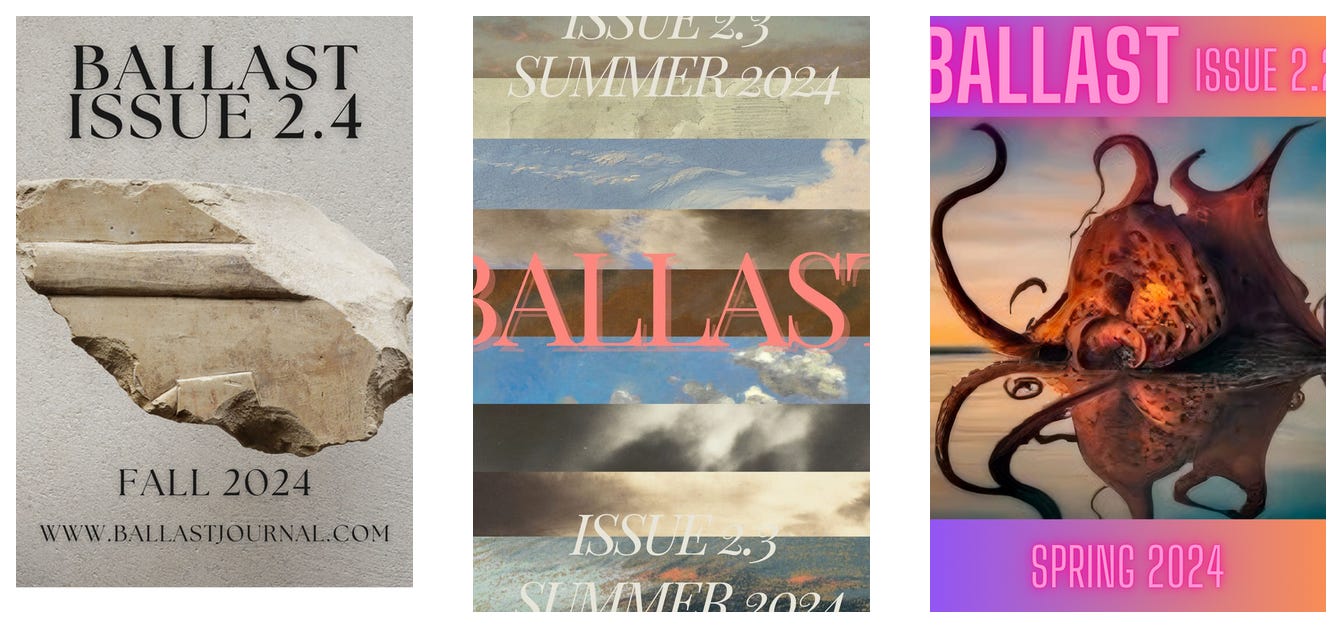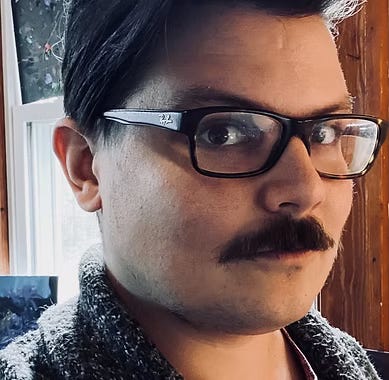Hi friends,
I’m excited to share an interview with Jacob Schepers, who co-founded ballast poetry journal with Sara Judy in 2022. Here is a bit about the publication.
Our mission is to add more poetry and literary discussions into the world by publishing writers and connecting those writers with other writers and readers. We are committed to remaining an accessible literary journal through year-round and fee-free submissions.
Ballast does not aim to fill a niche in poetry publishing — we just want to add more.
Aaron: First, can you tell me a bit about yourself? Before we dive into your writing, teaching, and publishing details, what’s your life like in a day-to-day sense? What’s a part of your routine that you look forward to most?
Jacob: I’m a Michigander originally and grew up in a small dairy farming community in which I was the typical artsy, creative type. The classic “fish out of water” story. Fortunately, I found a close-knit coterie of similar would-be outcasts that sought out (and often created) different venues for our musical, artistic, theatrical, and performing arts outlets. This was a transformational time in which I found myself and gave myself permission to explore alternative forms of expression outside of the common parameters of a polite, Midwest-nice upbringing.
Flash forward twenty years, my day-to-day life is both hectic and mundane in a fulfilling way. My partner is a social worker with fairly typical work hours from early morning to mid-afternoon, and since I have the flexibility in my teaching schedule, I’m primarily at home as a dad to four boys (ages 14, 11, 3, and 1). This means I’m getting everyone up and at ’em for the before-school necessities like breakfast-making, homework-wrangling, teeth-brushing, and diaper-changing before the kids and I all pile in to our mini-van for the school drop-offs. Then it’s me and the little guys for most of the midday where I’m squeezing in an email or journal correspondence if I happen to get naps to overlap. I head out to teach my writing or lit classes at the University of Notre Dame from about 3:00 to 7:00. Then I fly around town picking up the older kids from their beloved youth theatre program rehearsals, before finally settling in for an episode of TV or two (Yellowjackets, lately) before calling it a night.
Aaron: You had two collections come out in 2024 — the chapbook Connections & Choreography and a micro-chapbook called Shipwreck Abstracted. Can you tell us about those books and how they came together?
Jacob: Funnily enough, both of these fortuitous publications came about by revisiting and resurrecting two long-shelved projects.
Shipwreck Abstracted was a short series of eight or nine poems I wrote in 2012 after reading a bunch of Jorge Luis Borges and thinking about various smatterings around the philosophy of language (linguistic abstraction, symbolism, and nominalism being chief among them). Ghost City Press’ annual micro-chap summer series — which is soon approaching its tenth season! — seemed a natural fit to toss this work their way, and they did a fantastic job seeing my vision for it and bringing it out.
Connections & Choreography also started over a decade ago—back in 2013, I want to say — when I had recently learned that my first full-length collection (the elegiac prose-poem series A Bundle of Careful Compromises) was going to be released from the Buffalo, N.Y.-based Outriders Poetry Project. I was deep into a constraint-based writing kick, so the project started as a ten-paged poem written in fragments which I then recombined fragment by fragment upwards of seven times before finally settling on the four permutations that I ended with. It was a real headache to edit, but Craig Mullins at Bottlecap Press was a real trooper who saw what I was going after and he and I cranked it out with fury and flourish.
Aaron: In particular, Connections & Choreography is described as “a textual experiment consisting of poetic fragments — lines and phrases — undergoing transformation across four rearrangements.” What role does experimentation play in your writing process?
Jacob: Experimentation is crucial on both a critical and creative level. I’ve never really been a writer interested in the “observation à application” model of poetic epiphany and regularly eschew Wordsworth’s “thoughts recollected in tranquility.” I find the searching, grappling, messiness of partial discoveries amid chaos to be more generative for my writing practice, which in my view maps on to the nature of “experiment” as such.
On a related note, I tend to write in pronounced stops and starts, preferring to write a “project” rather than a “collection” of poems. For me, the concept of a work provides much of its animating impetus in the act of its creation, so I follow a trail’s scent whenever I pick up on it.
All in all, I’m an adherent to the “language as material” mandate — I’m most interested in putting as much pressure as I can on the material word itself (how it sounds, how it looks, how it means, how it connects, how it feels in the mouth), and Connections & Choreography is perhaps the clearest indication of that kind of extreme experimentation to that end.
Aaron: Taking a step back, how did you get interested in writing as a creative pursuit? (Feel free to share some significant points of your own journey here.)
Jacob: I mentioned earlier that I cut my teeth as a creative through music and the performing arts. I played for years in a garage band that drew heavily on groups like The Mars Volta and Coheed & Cambria. I entered college as an English and Theatre double-major. I played solo in the local coffee-house circuit with original songs that stemmed straight from my adoration of singer-songwriters like Elliott Smith, Bright Eyes, and Rufus Wainwright.
I was primed as a middling lyricist to focus more of my energy towards the words themselves, since I lacked the technical know-how of music production that my bandmates took care of. To that end, I dabbled in writing poetry just for the heck of it, but I remember sitting in a high school English class and turning the curriculum’s corner from Victorian narrative poetry into Imagism — particularly William Carlos William’s “Nantucket.” I was so struck by the open-ended thought provocation of that poem and its scenery rather than the didactic lessons of other poems, and I really started to develop a sincere interest in poetry in and of itself. Once I hit college classes that allowed for that kind of exploration, there was no stopping me. I’ve been reading, writing, studying, reviewing, editing, and publishing poetry ever since.
Aaron: You co-founded ballast journal with Sara Judy and serve as co-editor with her. What is the origin story of ballast? What made you both want to start a poetry journal?
Jacob: Ballast’s beginning actually arose from a stint in rehab back in 2020-2021 — something very few people know, actually (pretty much just Sara and my partner). It’s tempting and cute to retcon the origin and say the journal emerged from my own “personal pile of rubble” or something like that (after finally seeking help and getting diagnosed with and treated for Substance Abuse Disorder), but really the full-fledged plans for the journal came about in the summer of 2022 when I had a little more recovery time under my belt and sought some creative outlet that I could channel further energy into. Most folks in recovery are well aware of the dangers of idleness and complacency, so I was looking to challenge myself and do my part as a literary citizen of sorts.
I reached out to Sara, a phenomenally gifted poet in her own right and who I knew from our similar paths as PhD/MFA students at Notre Dame, to see whether she’d be interested. We were both a couple years out from finishing our degrees and missing that kind of creative community, so we dove in headfirst. We knew that our mutual poetic tastes were compatible and eclectic, and we were hungry for a place that would be welcome the weirdness: strange language, high concepts, topsy-turvy treatments of life imagined or real. There’s hardly a dearth for excellent poetry journals online, so our mandate has eschewed a particular style or aesthetic and, rather, seeks to add “more and more and more poetry,” especially the kind that we two wish we might have written ourselves.
Aaron: In your editor’s note to the current issue, you write, “Sara and I aren’t exactly SEO whiz kids or social influencers; rather, as we readily admit, we do this for the love of the game. Our labors (rough hewn though they may be) are homegrown and, we’ve found, thrive from the word-of-mouth buzz that you, our dear readers and contributors and contributors to be, generate on our behalf.”
Can you say more about the experience of starting a website (along with social media, etc.) without a specific digital marketing plan and how you’ve managed to gain readership since you started ballast?
(And for the record, I am no SEO whiz and have no marketing background myself, so I can certainly relate! I’m curious to get your take on the successes and/or challenges of spreading your love of poetry via this online platform.)
Jacob: What’s great about today’s climate of online lit mags is the fairly few barriers to entry. Sure, at ballast we’re not affiliated with any university or institution, but whatever lack of formal programming or funding we have gets offset by the speed at which Sara and I can move, read submissions, and get an issue together (we’ve been quarterly since January 2023). Between my master’s and doctoral programs, I did some work in online web sales, copywriting, and content management system (CMS) training for clients, and that experience has been invaluable in terms of having just enough know-how to muddle through Squarespace setup and general website design for our journal issues.
Maintaining a social media presence has felt more and more like a Faustian bargain as of late, and I know we’re hardly the only ones wrestling with that side of things. Throughout it all, though, our approach has consistently been to highlight each issue and each contributor as we can on our socials, and this content has helped us to celebrate the writers while showcasing their work, which we hope drives traffic to the site simply for the sheer pleasure of experiencing the journal issues as a unit in conversation among the contributors. We may not have the largest followings on our social channels, but our contributors who have worked with us seem to have enjoyed the thoughtfulness, autonomy, and community that we afford them. That might be our secret sauce, actually: just passionately trying to honor the words that come our way to the best of our ability.
Aaron: Can you say a bit about the review process at ballast? Specifically, what are a few pieces of insight that would be helpful to a submitter on the other side of things? Feel free to add a piece of advice you would pass along to lit mag submitters out there. Maybe a DO and/or a DON’T DO to keep in mind when submitting work?
Jacob: Sara and I are committed to keeping ballast a lit journal that is always open and always free to submit for as long as we are possible able. We have a DIY-aesthetic in that sense that makes ample use of our Gmail and our Google Sheets spreadsheet that we both have access to on the day-to-day. With Sara out in Manhattan and me in South Bend, we’re keeping up with our submission spreadsheet on our own and, since we stick to a ninety-day turnaround for any submissions we receive on a rolling basis, the two of us meet for a little Zoom editorial session every four to six weeks where we take stock of any “maybes” or split decisions we might have according to our submissions records and review notes.
From there, especially when a complete issue is taking shape, we tend to divide and conquer. Sara handles much of the “features” coordination like putting contributors in “dialogues” with one another or asking individuals to provide recordings of themselves reading/performing their work whereas I tend to take care of most of the social media and journal/issue designs.
As far as helpful tips for submitting to ballast, I can’t recommend highly enough to check out an issue or two. It’s a cliché for editors to say as much, but it holds true, particularly for ballast. Sara and I tend to recognize a “ballast poem” when it comes our way—regardless of the publication history or pedigree of its submitter — and we’ve turned down many writers who craft wonderful, inventive, and acclaim-worthy poems just because the work didn’t quite “fit” with the kind of work that we happen to be drawn to and which we’ve built our community around.
Another piece of advice I’d like to offer is our hidden-gem of a webpage on the ballast site of our “recommended journal and presses.” Chances are that if you find work you’re drawn to there, you’ll find a ready kinship with ballast and vice versa.
More concretely:
A DO for submitters would be to see who we publish. Recognize any names? Follow anyone? Know where they’ve submitted? If so, seek out that like-minded community and add ballast to that list!
A DON’T for submitters would be to send a submission our way with such range that we as editors don’t have a chance to parse out who you are as a unique writer. Now, don’t get me wrong, I admire writers who can codeswitch or have a chameleon-like ability to meet a journal’s eclectic tastes, but at the same time I tend to value writers and submissions who are unapologetically themselves and are confident in their vision. Even if our journal isn’t quite the right fit for that vision, the confident forethought and design is very likely going to find a home somewhere, that’s for sure.
“Sara [co-editor] and I aren’t exactly SEO whiz kids or social influencers; rather, as we readily admit, we do this for the love of the game. Our labors (rough hewn though they may be) are homegrown and, we’ve found, thrive from the word-of-mouth buzz that you, our dear readers and contributors and contributors to be, generate on our behalf.”
Aaron: I see that your path has come through Buffalo, NY, where I’m located. Do you still have any connections to Buffalo and the writing community here?
Jacob: Yes, Buffalo is a special spot! I did my MA at the University at Buffalo with the lauded Poetics Program just as the Great Recession was easing up. Steve McCaffery guided my thesis, and I was fortunate enough to overlap with writers like Divya Victor, Kristina Marie Darling, Joe Hall, Michael Flatt, and others while I was there. I was just a baby grad student in those days and much more of a wallflower, so I likely didn’t attract much attention to myself, but I learned plenty just by sharing space with them in the Graduate Poetics Group and in local readings in the back room at Rust Belt Books.
Most of my connections and correspondence these days take the form of social media interactions. The last time I was in Buffalo was all the way back in 2016 for the conference “Poetics: (The Next) 25 Years,” but I had the pleasure of publishing a poem in the BlazeVOX anthology My Next Heart: New Buffalo Poetry, edited by Noah Falck and Justin Karcher, so I at least held my honorary Buffalo card back then still!
Aaron: Who are some of your favorite writers (or those most influential to you)? What have you read recently that stands out?
Jacob: First off, my all-time favorite poem is Wallace Steven’s “Final Soliloquy of the Interior Paramour.” But the writer who I’ve long considered my most influential is A. R. Ammons. Tape for the Turn of the Year and Garbage are two of my favorite volumes and, uncoincidentally, both are project- or concept-driven books. Beyond that, though, I find Ammons’ blend of high-register philosophical musings alongside his low-brow, even crass, observations to be quite similar to my own wry or sardonic style. I’m a big fan, too, of other wry writers with almost a stand-up comedy quality to their writing — I’m thinking here of David Antin, Natalie Shapero, Ben Lerner, Matthew Rohrer, and Douglas Kearney.
Franny Choi and Danez Smith are standouts for poets of a similar age. They’re rockstars. I’ve just finished reading through Agha Shahid Ali’s Call Me Ishmael Tonight, which took my breath away multiple times.
Aaron: Lastly, can you leave us with a writing prompt or exercise that you like? Very open-ended here — anything that our readers can use today in their notebooks.
Jacob: Love this. I’m a big fan of embodied writing practices in general, particularly ones that shake up the writerly routine that someone may have established. In one of my earliest poetry workshops as a student, a professor shared how Jean-Michel Basquiat would wear Armani suits while painting, and I’ve riffed on that in my own workshops by encouraging writers to adorn themselves in some outfit or article of clothing they never would have imagined wearing while writing a poem.
So here it is:
Dress up in as formal of attire as you might have around you. Sit down in your usual writing space and write a poem that resists mentioning the change of clothes but nonetheless explores your thoughts on habits and/or on change.
Jacob Schepers is a Midwest poet and the author of the full-length collection A Bundle of Careful Compromises and the chapbooks Connections & Choreography and Shipwreck Abstracted. His poems have recently appeared in or are forthcoming in antiphony, DIALOGIST, The Greensboro Review, Harpur Palate, Heavy Feather Review, Hobart, Indianapolis Review, The Shore, Psaltery & Lyre, Wild Roof Journal, and elsewhere. His reviews and critical work have appeared in Tupelo Quarterly, The Fanzine, Entropy, Cleveland Review of Books, and Contemporary Women’s Writing. He received his MFA and PhD from the University of Notre Dame, where he teaches in the University Writing Program. With Sara Judy, he edits the nonprofit literary journal ballast. He lives in South Bend, Indiana, with his wife and their four sons. More at www.jacobschepers.com, @jacobschepers on Instagram and @jacobschepers.bsky.social on Bluesky.
Subscribe to see more guest posts from WRJ’s amazing contributors / Paid access includes opportunities for editorial feedback and free submissions for upcoming issues.









